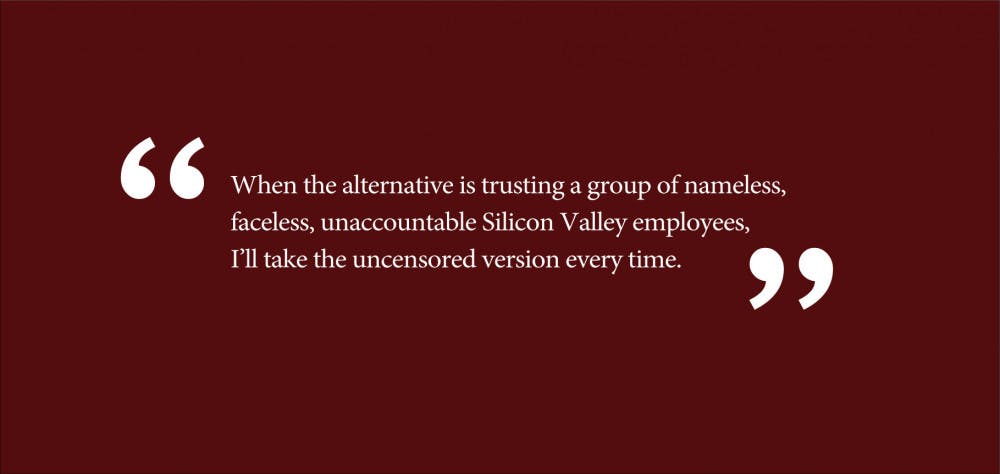Late last month, Facebook CEO Mark Zuckerberg gave a speech at Georgetown University outlining Facebook’s policy on political advertisements. In it, Zuckerberg announced that Facebook would continue publishing political ads, even those that include misleading or demonstrably false claims. Zuckerberg’s speech comes after Facebook began running a Trump re-election ad attacking Democratic presidential candidate Joe Biden — the contents of the ad have since been rated false by independent fact checkers. In the ensuing weeks, progressives have criticized Facebook for profiting from ads which, they argue, subvert our democracy by spreading misinformation. Democratic politicians have called on Facebook and other tech companies to take steps to prevent the spread of “fake news.” And recently, Twitter announced that it will stop running political ads altogether.
Those calling on Facebook to crack down on misinformation seem to have fallen into the classic have-your-cake-and-eat-it-too trap. After Facebook exposed the personal data of 87 million users to Cambridge Analytica, a consulting firm that worked for the Trump campaign in 2016, progressives decried Facebook for its recklessness. But the same people who attacked Facebook for its irresponsibility now want to make it the umpire of truth and lies in our political discourse. To be certain, publishing lies is distasteful. And if people believe those lies and allow them to affect their vote, this remains a real, and as yet unsolved, democratic problem. But when the alternative is trusting a group of nameless, faceless, unaccountable Silicon Valley employees, I’ll take the uncensored version every time.
I don’t trust Facebook to discern what is true and false. I don’t trust it to draw the line between exaggeration and fabrication. Let us hear it all and judge for ourselves what is to be believed and what is not.
But this isn’t just a Facebook problem. Creating a methodology to determine what should and should not be censored is difficult — and there is little consensus on where the boundaries of acceptability ought to lie. Such a standard is difficult to create because the stakes are so high — it must never fail. The right of free expression is sacred. And if the criteria we make suppress a true and valid expression of free speech even one time, they cannot be relied upon. Facebook may not be bound by the First Amendment, but, for better or worse, Facebook is interwoven into the fabric of our society. And so long as it proclaims political neutrality, it ought to be just as responsible for protecting free speech as the government.
In the end, more information is better. Perhaps I’m too idealistic, but I would rather Facebook publish a misleading political ad so that I know which politicians are willing to lie for votes — so I can be sure not to vote for them. It is the individual’s responsibility to become informed about political candidates. For instance, individuals should take advantage of the many news outlets that run fact checks of campaign ads. It’s not Facebook’s responsibility to make sure people are informed, it’s our own.
Because Facebook can’t be trusted to walk the fine line between preserving free speech and shielding credulous users from misinformation, it should either allow all types of ads or, as some have suggested, ban political ads altogether. But there is a compelling reason to take the former approach. Banning political Facebook ads favors incumbents and well-funded politicians. A single television spot can cost thousands of dollars to run. But Facebook ad campaigns can be done in a piecemeal fashion; Facebook allows you to set a budget and target as many people as possible within that budget. Furthermore, is it not simply better to allow politicians to communicate with as many voters as possible? As people migrate away from their televisions and radios and toward their laptops, communicating with voters online will become an imperative for any candidate.
For that reason, it is critical to maintain uncensored avenues of political expression. In a perfect world, candidates wouldn’t dare make specious claims in their political advertisements. But so long as those types of ads work, they are likely to remain in use. So companies like Facebook are left with roughly three options: allow them all, ban them all or make themselves the arbiters of what is permissible political expression. There are downsides to all three options, to be sure. But the least bad option among these is to allow all forms of political speech — and leave the final word to the judgment of the people.
Andrew Reed ’21 can be reached at andrew_reed@brown.edu. Please send responses to this opinion to letters@browndailyherald.com and op-eds to opinions@browndailyherald.com.





